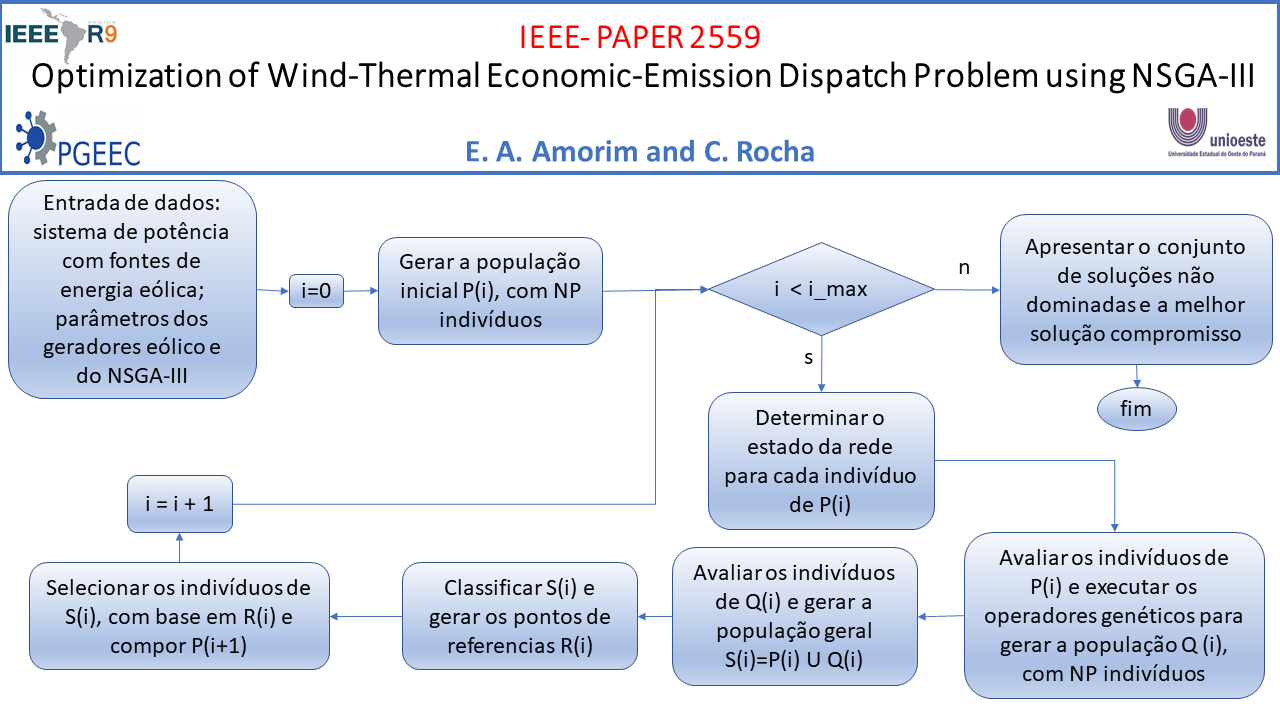Optimization of Wind-Thermal Economic-Emission Dispatch Problem using NSGA-III
Keywords:
Economic-emission dispatch, Many-objective optimization, Wind powerAbstract
Economic-emission dispatch (EED) of an electric power system can be considered as one of the most popular constrained multi-objective problems. In this paper the EED is formulated as a many-objective optimization problem with that consider the minimization of cost of thermal fuels, wind generation, greenhouse gas emission, and active power losses in transmission lines, satisfying physical and operational constraints of the system. To solve the EED problem with incorporate renewable power generations, a version of constrained many-objective optimization algorithm called non- dominated sorting genetic algorithm-III (NSGA-III) is proposed. The NSGA-III is based on reference points and explores the dominance relation criterion based on the constraints violation to select the new generation. To validate the efficiency and robustness of the proposed EED model and solution technique, results and analysis of the simulations with the IEEE-30 test system are presented.
Downloads
References
B. Y. Qu, Y. S. Zhu, Y. C. Jiao, M. Y. Wu, P. N. Suganthan, J. J. Liang, “A survey on multi-objective evolutionary algorithm for the solution on the environmental/economic dispatch problem.” Swarm and Evolutionary Computation, vol. 38, pp. 1-11, 2018.
P. P. Biswas, “Evolutionary algorithms for solving power system optimization problems,” Doctoral thesis, Nanyang Technological University, Singapore, 2019.
H. T Jadhav and R. Roy, “Gbest guided artificial bee colony algorithm for environmental/economic dispatch considering wind power,’ Expert Syst. Appl., vol. 40, pp. 6385-6399, 2013.
N. A. Khan, A. B. Awan, A. Mahmood, S. Razzaq, A. Zafar, and G. A. S. Sidhu, "Combined emission economic dispatch of power system including solar photovoltaic generation." Energy Conversion and Management, vol. 92, pp. 82-91, 2015.
X. Yuan, H. Tian, Y. Yuan, Y. Huang, R. M. Ikram, “An extended NSGA-III for solution multi-objective hydro-thermal-wind scheduling considering power cost,” algorithm,” Energy Convers Manage, vol. 96, pp. 568–578, 2015.
B. Y. Qu, J. J. Liang, Y. S. Zhu, Z. Y. Wang, P. N. Suganthan, “Economic emission dispatch problems with stochastic wind power using summation based multi-objective evolutionary algorithm,” Inf. Sci., vol. 351, pp. 48-66, Jul. 2016.
S. Jiang, C. Zhang, W. Wu, and S. Chen, “Combined economic and emission problem of wind-thermal power system using gravitational particle swarm optimization algorithm,” Hindawi Mathematical Problems in Engineering; vol. 2019, Article ID. 5679361, pp.1-19, 2019.
R. Ahmed and Abul’Wafa, “Optimization of economic/emission load dispatch for hybrid generating systems using controlled Elitist NSGAII,” Electr. Power Syst. Res., vol. 105, pp.142-151, Dec. 2013.
P. P. Biswas, P. N. Suganthan, B. Y. Qu and G. A. J. Amaratunga, “Multiobjective economic-environmental power dispatch with stochastic wind-solar-small hydro power,” Energy vol. 150, pp, 1039-1057, May. 2018.
Deb K, Jain H. An evolutionary many-objective optimization algorithm using reference-point-based non-dominated sorting approach, Part II: handling constraints and extending to an adaptive approach. IEEE Trans Evol. Comput., vol. 18, no. 4, pp. 602–622, 2014.
Power System Test Case Archive, [online] Available: http://www.ee.washington.edu/research/pstca/. Acessado em Nov. 2019.
M. R Chen, G. Q Zeng and K. D. Lu, “Constrained multi-objective population extremal optimization based economic-emission dispatch incorporating renewable energy resources,” Renewable Energy; vol. 143, pp. 277-294, 2019.
J. D. Glover, T. Overbye, M. S. Sarma, “Power System Analysis and Design,” Cengage Learning, Ed. 6, 2016.
Y. Liu, D. Gong, X. Sun, Y. Zhang, “Many-Objective evolutionary optimization based on reference points.” Applies Soft Computing, vol. 50, pp. 344-3555, May 2017.
K. Deb, “Multi-objective optimization using evolutionary algorithm,” Chichester: John Woley & Sons, 2009.
H. Pulluri, R. Naresh, and V. Sharma, "An enhanced self-adaptive differential evolution-based solution methodology for multiobjective optimal power flow.” Applies Soft Computing, vol. 54, pp. 229-245, May 2017.
Instituto Nacional de Meteorologia (INMET). Disponível em: http://www.inmet.gov.br/projetos/rede/pesquisa/. Acessado em Fev. 2019.
M., Ghasemi, S. Ghavidel, M. Gitizadeh, and E. Akbari, “An improved teaching-learning-based optimization algorithm using Lévy mutation strategy for non-smooth optimal power flow,” Electrical Power and Energy Systems, vol. 65, pp. 375-384, 2015.


